Developing Academic Communication Skills (LDT3101)
VerifiedAdded on 2023/06/17
|6
|2033
|285
AI Summary
This presentation discusses the difference between academic and other writing, the purpose and features of academic writing, key elements of academic writing, and vocabulary issues and types of abbreviations. It also includes notes and references for further reading.
Contribute Materials
Your contribution can guide someone’s learning journey. Share your
documents today.
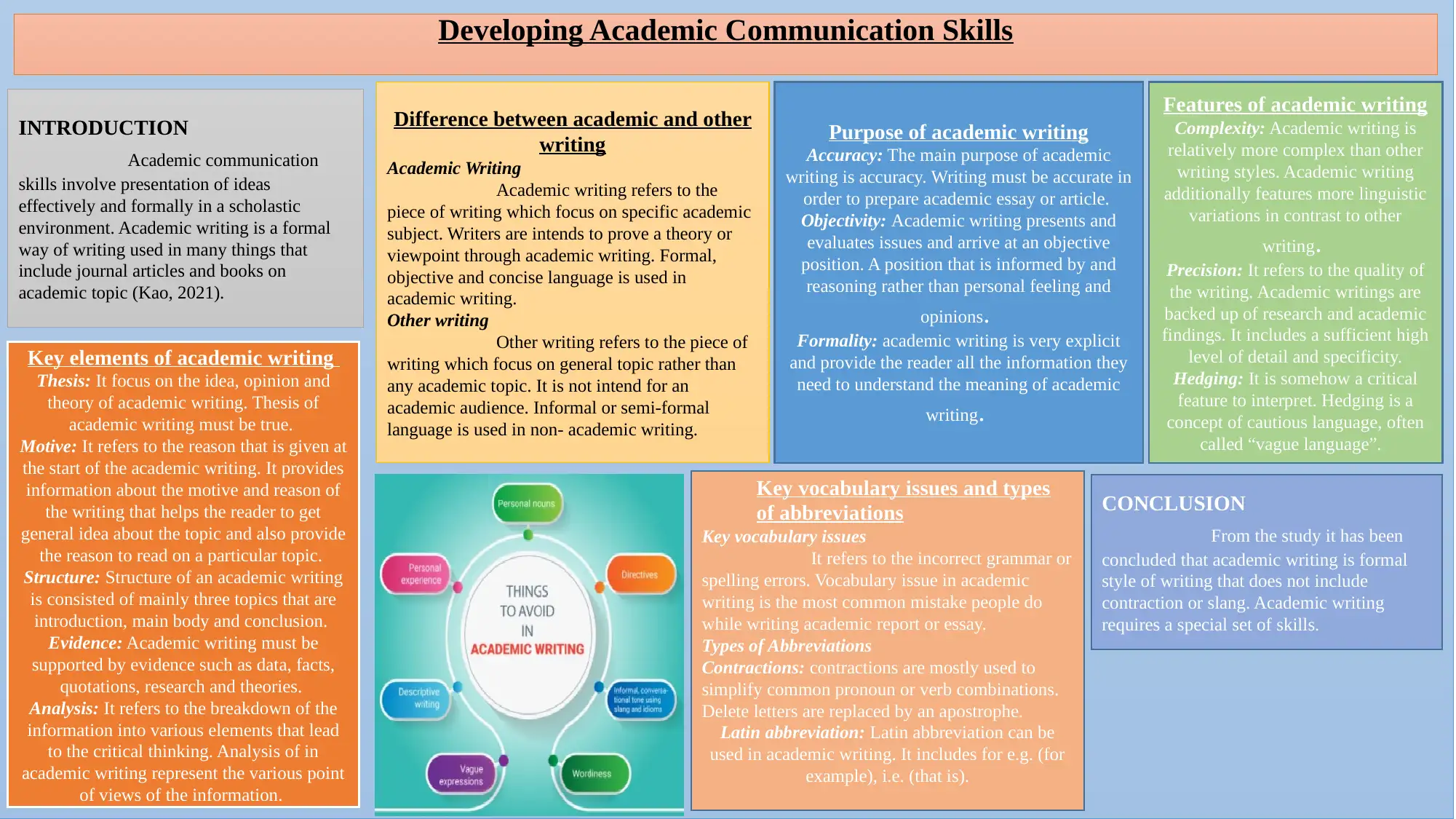
Developing Academic Communication Skills
INTRODUCTION
Academic communication
skills involve presentation of ideas
effectively and formally in a scholastic
environment. Academic writing is a formal
way of writing used in many things that
include journal articles and books on
academic topic (Kao, 2021).
Difference between academic and other
writing
Academic Writing
Academic writing refers to the
piece of writing which focus on specific academic
subject. Writers are intends to prove a theory or
viewpoint through academic writing. Formal,
objective and concise language is used in
academic writing.
Other writing
Other writing refers to the piece of
writing which focus on general topic rather than
any academic topic. It is not intend for an
academic audience. Informal or semi-formal
language is used in non- academic writing.
Purpose of academic writing
Accuracy: The main purpose of academic
writing is accuracy. Writing must be accurate in
order to prepare academic essay or article.
Objectivity: Academic writing presents and
evaluates issues and arrive at an objective
position. A position that is informed by and
reasoning rather than personal feeling and
opinions.
Formality: academic writing is very explicit
and provide the reader all the information they
need to understand the meaning of academic
writing.
Features of academic writing
Complexity: Academic writing is
relatively more complex than other
writing styles. Academic writing
additionally features more linguistic
variations in contrast to other
writing.
Precision: It refers to the quality of
the writing. Academic writings are
backed up of research and academic
findings. It includes a sufficient high
level of detail and specificity.
Hedging: It is somehow a critical
feature to interpret. Hedging is a
concept of cautious language, often
called “vague language”.
Key elements of academic writing
Thesis: It focus on the idea, opinion and
theory of academic writing. Thesis of
academic writing must be true.
Motive: It refers to the reason that is given at
the start of the academic writing. It provides
information about the motive and reason of
the writing that helps the reader to get
general idea about the topic and also provide
the reason to read on a particular topic.
Structure: Structure of an academic writing
is consisted of mainly three topics that are
introduction, main body and conclusion.
Evidence: Academic writing must be
supported by evidence such as data, facts,
quotations, research and theories.
Analysis: It refers to the breakdown of the
information into various elements that lead
to the critical thinking. Analysis of in
academic writing represent the various point
of views of the information.
Key vocabulary issues and types
of abbreviations
Key vocabulary issues
It refers to the incorrect grammar or
spelling errors. Vocabulary issue in academic
writing is the most common mistake people do
while writing academic report or essay.
Types of Abbreviations
Contractions: contractions are mostly used to
simplify common pronoun or verb combinations.
Delete letters are replaced by an apostrophe.
Latin abbreviation: Latin abbreviation can be
used in academic writing. It includes for e.g. (for
example), i.e. (that is).
CONCLUSION
From the study it has been
concluded that academic writing is formal
style of writing that does not include
contraction or slang. Academic writing
requires a special set of skills.
INTRODUCTION
Academic communication
skills involve presentation of ideas
effectively and formally in a scholastic
environment. Academic writing is a formal
way of writing used in many things that
include journal articles and books on
academic topic (Kao, 2021).
Difference between academic and other
writing
Academic Writing
Academic writing refers to the
piece of writing which focus on specific academic
subject. Writers are intends to prove a theory or
viewpoint through academic writing. Formal,
objective and concise language is used in
academic writing.
Other writing
Other writing refers to the piece of
writing which focus on general topic rather than
any academic topic. It is not intend for an
academic audience. Informal or semi-formal
language is used in non- academic writing.
Purpose of academic writing
Accuracy: The main purpose of academic
writing is accuracy. Writing must be accurate in
order to prepare academic essay or article.
Objectivity: Academic writing presents and
evaluates issues and arrive at an objective
position. A position that is informed by and
reasoning rather than personal feeling and
opinions.
Formality: academic writing is very explicit
and provide the reader all the information they
need to understand the meaning of academic
writing.
Features of academic writing
Complexity: Academic writing is
relatively more complex than other
writing styles. Academic writing
additionally features more linguistic
variations in contrast to other
writing.
Precision: It refers to the quality of
the writing. Academic writings are
backed up of research and academic
findings. It includes a sufficient high
level of detail and specificity.
Hedging: It is somehow a critical
feature to interpret. Hedging is a
concept of cautious language, often
called “vague language”.
Key elements of academic writing
Thesis: It focus on the idea, opinion and
theory of academic writing. Thesis of
academic writing must be true.
Motive: It refers to the reason that is given at
the start of the academic writing. It provides
information about the motive and reason of
the writing that helps the reader to get
general idea about the topic and also provide
the reason to read on a particular topic.
Structure: Structure of an academic writing
is consisted of mainly three topics that are
introduction, main body and conclusion.
Evidence: Academic writing must be
supported by evidence such as data, facts,
quotations, research and theories.
Analysis: It refers to the breakdown of the
information into various elements that lead
to the critical thinking. Analysis of in
academic writing represent the various point
of views of the information.
Key vocabulary issues and types
of abbreviations
Key vocabulary issues
It refers to the incorrect grammar or
spelling errors. Vocabulary issue in academic
writing is the most common mistake people do
while writing academic report or essay.
Types of Abbreviations
Contractions: contractions are mostly used to
simplify common pronoun or verb combinations.
Delete letters are replaced by an apostrophe.
Latin abbreviation: Latin abbreviation can be
used in academic writing. It includes for e.g. (for
example), i.e. (that is).
CONCLUSION
From the study it has been
concluded that academic writing is formal
style of writing that does not include
contraction or slang. Academic writing
requires a special set of skills.
Secure Best Marks with AI Grader
Need help grading? Try our AI Grader for instant feedback on your assignments.
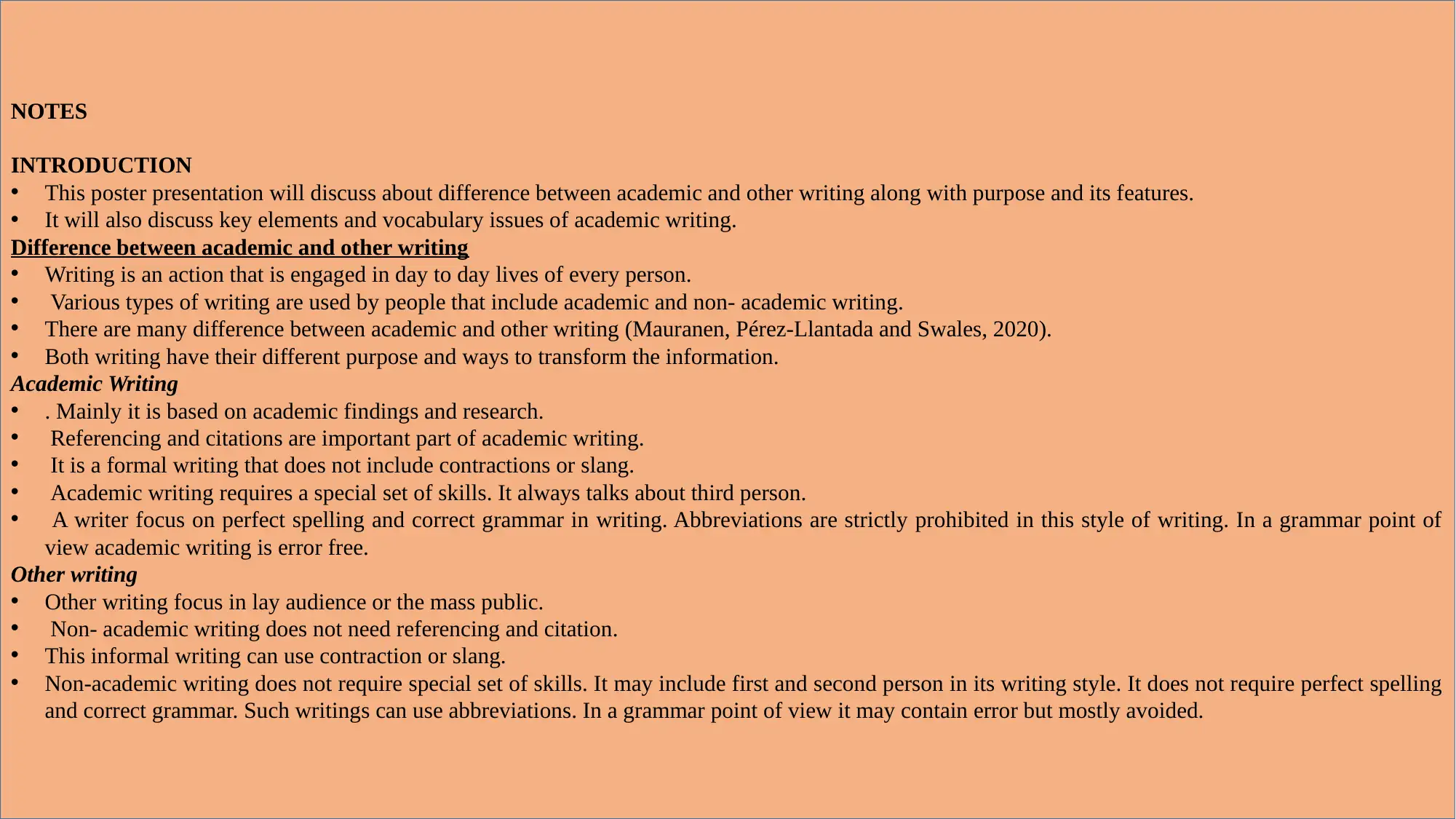
NOTES
INTRODUCTION
• This poster presentation will discuss about difference between academic and other writing along with purpose and its features.
• It will also discuss key elements and vocabulary issues of academic writing.
Difference between academic and other writing
• Writing is an action that is engaged in day to day lives of every person.
• Various types of writing are used by people that include academic and non- academic writing.
• There are many difference between academic and other writing (Mauranen, Pérez-Llantada and Swales, 2020).
• Both writing have their different purpose and ways to transform the information.
Academic Writing
• . Mainly it is based on academic findings and research.
• Referencing and citations are important part of academic writing.
• It is a formal writing that does not include contractions or slang.
• Academic writing requires a special set of skills. It always talks about third person.
• A writer focus on perfect spelling and correct grammar in writing. Abbreviations are strictly prohibited in this style of writing. In a grammar point of
view academic writing is error free.
Other writing
• Other writing focus in lay audience or the mass public.
• Non- academic writing does not need referencing and citation.
• This informal writing can use contraction or slang.
• Non-academic writing does not require special set of skills. It may include first and second person in its writing style. It does not require perfect spelling
and correct grammar. Such writings can use abbreviations. In a grammar point of view it may contain error but mostly avoided.
INTRODUCTION
• This poster presentation will discuss about difference between academic and other writing along with purpose and its features.
• It will also discuss key elements and vocabulary issues of academic writing.
Difference between academic and other writing
• Writing is an action that is engaged in day to day lives of every person.
• Various types of writing are used by people that include academic and non- academic writing.
• There are many difference between academic and other writing (Mauranen, Pérez-Llantada and Swales, 2020).
• Both writing have their different purpose and ways to transform the information.
Academic Writing
• . Mainly it is based on academic findings and research.
• Referencing and citations are important part of academic writing.
• It is a formal writing that does not include contractions or slang.
• Academic writing requires a special set of skills. It always talks about third person.
• A writer focus on perfect spelling and correct grammar in writing. Abbreviations are strictly prohibited in this style of writing. In a grammar point of
view academic writing is error free.
Other writing
• Other writing focus in lay audience or the mass public.
• Non- academic writing does not need referencing and citation.
• This informal writing can use contraction or slang.
• Non-academic writing does not require special set of skills. It may include first and second person in its writing style. It does not require perfect spelling
and correct grammar. Such writings can use abbreviations. In a grammar point of view it may contain error but mostly avoided.
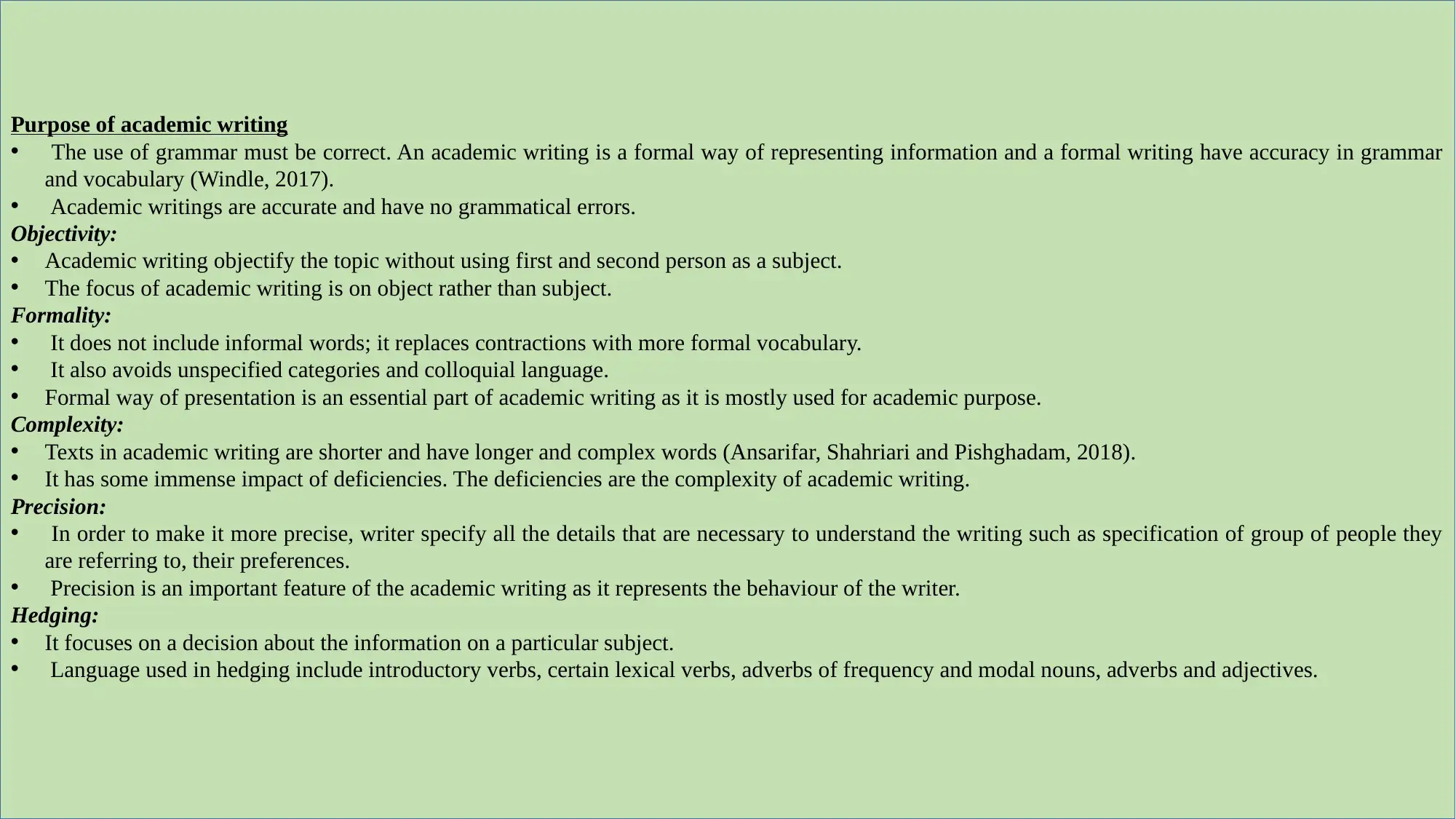
Purpose of academic writing
• The use of grammar must be correct. An academic writing is a formal way of representing information and a formal writing have accuracy in grammar
and vocabulary (Windle, 2017).
• Academic writings are accurate and have no grammatical errors.
Objectivity:
• Academic writing objectify the topic without using first and second person as a subject.
• The focus of academic writing is on object rather than subject.
Formality:
• It does not include informal words; it replaces contractions with more formal vocabulary.
• It also avoids unspecified categories and colloquial language.
• Formal way of presentation is an essential part of academic writing as it is mostly used for academic purpose.
Complexity:
• Texts in academic writing are shorter and have longer and complex words (Ansarifar, Shahriari and Pishghadam, 2018).
• It has some immense impact of deficiencies. The deficiencies are the complexity of academic writing.
Precision:
• In order to make it more precise, writer specify all the details that are necessary to understand the writing such as specification of group of people they
are referring to, their preferences.
• Precision is an important feature of the academic writing as it represents the behaviour of the writer.
Hedging:
• It focuses on a decision about the information on a particular subject.
• Language used in hedging include introductory verbs, certain lexical verbs, adverbs of frequency and modal nouns, adverbs and adjectives.
• The use of grammar must be correct. An academic writing is a formal way of representing information and a formal writing have accuracy in grammar
and vocabulary (Windle, 2017).
• Academic writings are accurate and have no grammatical errors.
Objectivity:
• Academic writing objectify the topic without using first and second person as a subject.
• The focus of academic writing is on object rather than subject.
Formality:
• It does not include informal words; it replaces contractions with more formal vocabulary.
• It also avoids unspecified categories and colloquial language.
• Formal way of presentation is an essential part of academic writing as it is mostly used for academic purpose.
Complexity:
• Texts in academic writing are shorter and have longer and complex words (Ansarifar, Shahriari and Pishghadam, 2018).
• It has some immense impact of deficiencies. The deficiencies are the complexity of academic writing.
Precision:
• In order to make it more precise, writer specify all the details that are necessary to understand the writing such as specification of group of people they
are referring to, their preferences.
• Precision is an important feature of the academic writing as it represents the behaviour of the writer.
Hedging:
• It focuses on a decision about the information on a particular subject.
• Language used in hedging include introductory verbs, certain lexical verbs, adverbs of frequency and modal nouns, adverbs and adjectives.
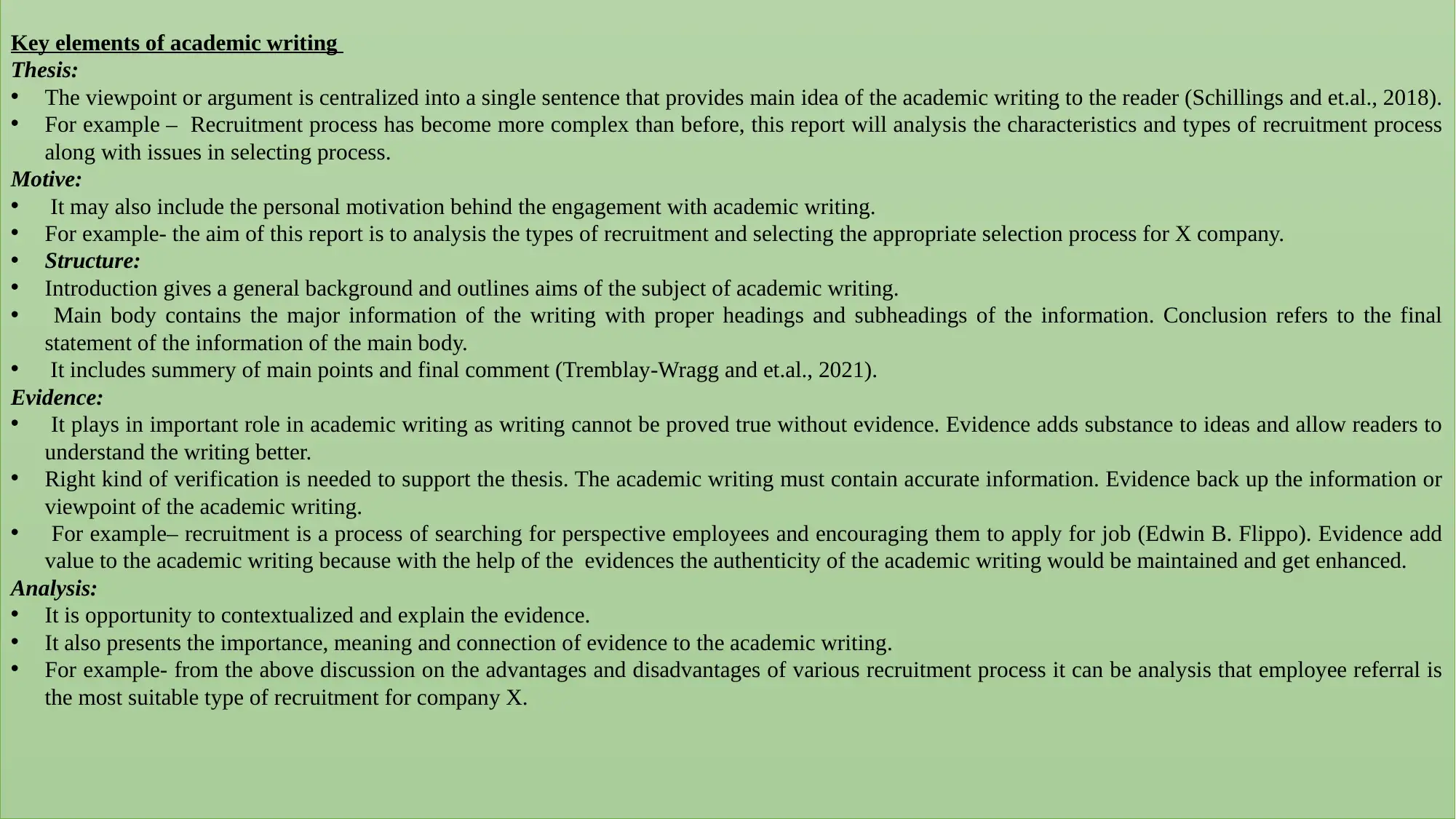
Key elements of academic writing
Thesis:
• The viewpoint or argument is centralized into a single sentence that provides main idea of the academic writing to the reader (Schillings and et.al., 2018).
• For example – Recruitment process has become more complex than before, this report will analysis the characteristics and types of recruitment process
along with issues in selecting process.
Motive:
• It may also include the personal motivation behind the engagement with academic writing.
• For example- the aim of this report is to analysis the types of recruitment and selecting the appropriate selection process for X company.
• Structure:
• Introduction gives a general background and outlines aims of the subject of academic writing.
• Main body contains the major information of the writing with proper headings and subheadings of the information. Conclusion refers to the final
statement of the information of the main body.
• It includes summery of main points and final comment (Tremblay-Wragg and et.al., 2021).
Evidence:
• It plays in important role in academic writing as writing cannot be proved true without evidence. Evidence adds substance to ideas and allow readers to
understand the writing better.
• Right kind of verification is needed to support the thesis. The academic writing must contain accurate information. Evidence back up the information or
viewpoint of the academic writing.
• For example– recruitment is a process of searching for perspective employees and encouraging them to apply for job (Edwin B. Flippo). Evidence add
value to the academic writing because with the help of the evidences the authenticity of the academic writing would be maintained and get enhanced.
Analysis:
• It is opportunity to contextualized and explain the evidence.
• It also presents the importance, meaning and connection of evidence to the academic writing.
• For example- from the above discussion on the advantages and disadvantages of various recruitment process it can be analysis that employee referral is
the most suitable type of recruitment for company X.
Thesis:
• The viewpoint or argument is centralized into a single sentence that provides main idea of the academic writing to the reader (Schillings and et.al., 2018).
• For example – Recruitment process has become more complex than before, this report will analysis the characteristics and types of recruitment process
along with issues in selecting process.
Motive:
• It may also include the personal motivation behind the engagement with academic writing.
• For example- the aim of this report is to analysis the types of recruitment and selecting the appropriate selection process for X company.
• Structure:
• Introduction gives a general background and outlines aims of the subject of academic writing.
• Main body contains the major information of the writing with proper headings and subheadings of the information. Conclusion refers to the final
statement of the information of the main body.
• It includes summery of main points and final comment (Tremblay-Wragg and et.al., 2021).
Evidence:
• It plays in important role in academic writing as writing cannot be proved true without evidence. Evidence adds substance to ideas and allow readers to
understand the writing better.
• Right kind of verification is needed to support the thesis. The academic writing must contain accurate information. Evidence back up the information or
viewpoint of the academic writing.
• For example– recruitment is a process of searching for perspective employees and encouraging them to apply for job (Edwin B. Flippo). Evidence add
value to the academic writing because with the help of the evidences the authenticity of the academic writing would be maintained and get enhanced.
Analysis:
• It is opportunity to contextualized and explain the evidence.
• It also presents the importance, meaning and connection of evidence to the academic writing.
• For example- from the above discussion on the advantages and disadvantages of various recruitment process it can be analysis that employee referral is
the most suitable type of recruitment for company X.
Secure Best Marks with AI Grader
Need help grading? Try our AI Grader for instant feedback on your assignments.
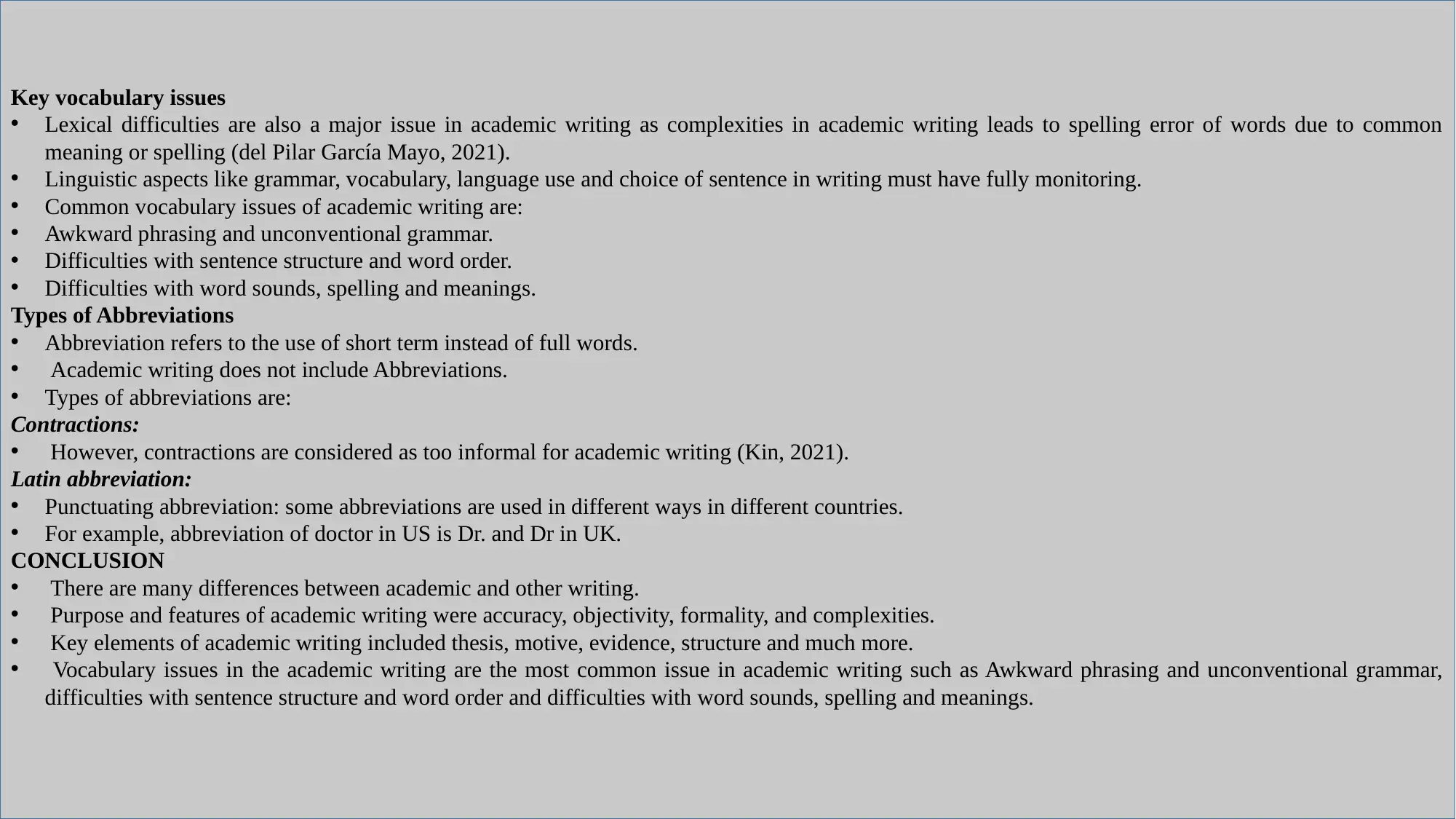
Key vocabulary issues
• Lexical difficulties are also a major issue in academic writing as complexities in academic writing leads to spelling error of words due to common
meaning or spelling (del Pilar García Mayo, 2021).
• Linguistic aspects like grammar, vocabulary, language use and choice of sentence in writing must have fully monitoring.
• Common vocabulary issues of academic writing are:
• Awkward phrasing and unconventional grammar.
• Difficulties with sentence structure and word order.
• Difficulties with word sounds, spelling and meanings.
Types of Abbreviations
• Abbreviation refers to the use of short term instead of full words.
• Academic writing does not include Abbreviations.
• Types of abbreviations are:
Contractions:
• However, contractions are considered as too informal for academic writing (Kin, 2021).
Latin abbreviation:
• Punctuating abbreviation: some abbreviations are used in different ways in different countries.
• For example, abbreviation of doctor in US is Dr. and Dr in UK.
CONCLUSION
• There are many differences between academic and other writing.
• Purpose and features of academic writing were accuracy, objectivity, formality, and complexities.
• Key elements of academic writing included thesis, motive, evidence, structure and much more.
• Vocabulary issues in the academic writing are the most common issue in academic writing such as Awkward phrasing and unconventional grammar,
difficulties with sentence structure and word order and difficulties with word sounds, spelling and meanings.
• Lexical difficulties are also a major issue in academic writing as complexities in academic writing leads to spelling error of words due to common
meaning or spelling (del Pilar García Mayo, 2021).
• Linguistic aspects like grammar, vocabulary, language use and choice of sentence in writing must have fully monitoring.
• Common vocabulary issues of academic writing are:
• Awkward phrasing and unconventional grammar.
• Difficulties with sentence structure and word order.
• Difficulties with word sounds, spelling and meanings.
Types of Abbreviations
• Abbreviation refers to the use of short term instead of full words.
• Academic writing does not include Abbreviations.
• Types of abbreviations are:
Contractions:
• However, contractions are considered as too informal for academic writing (Kin, 2021).
Latin abbreviation:
• Punctuating abbreviation: some abbreviations are used in different ways in different countries.
• For example, abbreviation of doctor in US is Dr. and Dr in UK.
CONCLUSION
• There are many differences between academic and other writing.
• Purpose and features of academic writing were accuracy, objectivity, formality, and complexities.
• Key elements of academic writing included thesis, motive, evidence, structure and much more.
• Vocabulary issues in the academic writing are the most common issue in academic writing such as Awkward phrasing and unconventional grammar,
difficulties with sentence structure and word order and difficulties with word sounds, spelling and meanings.
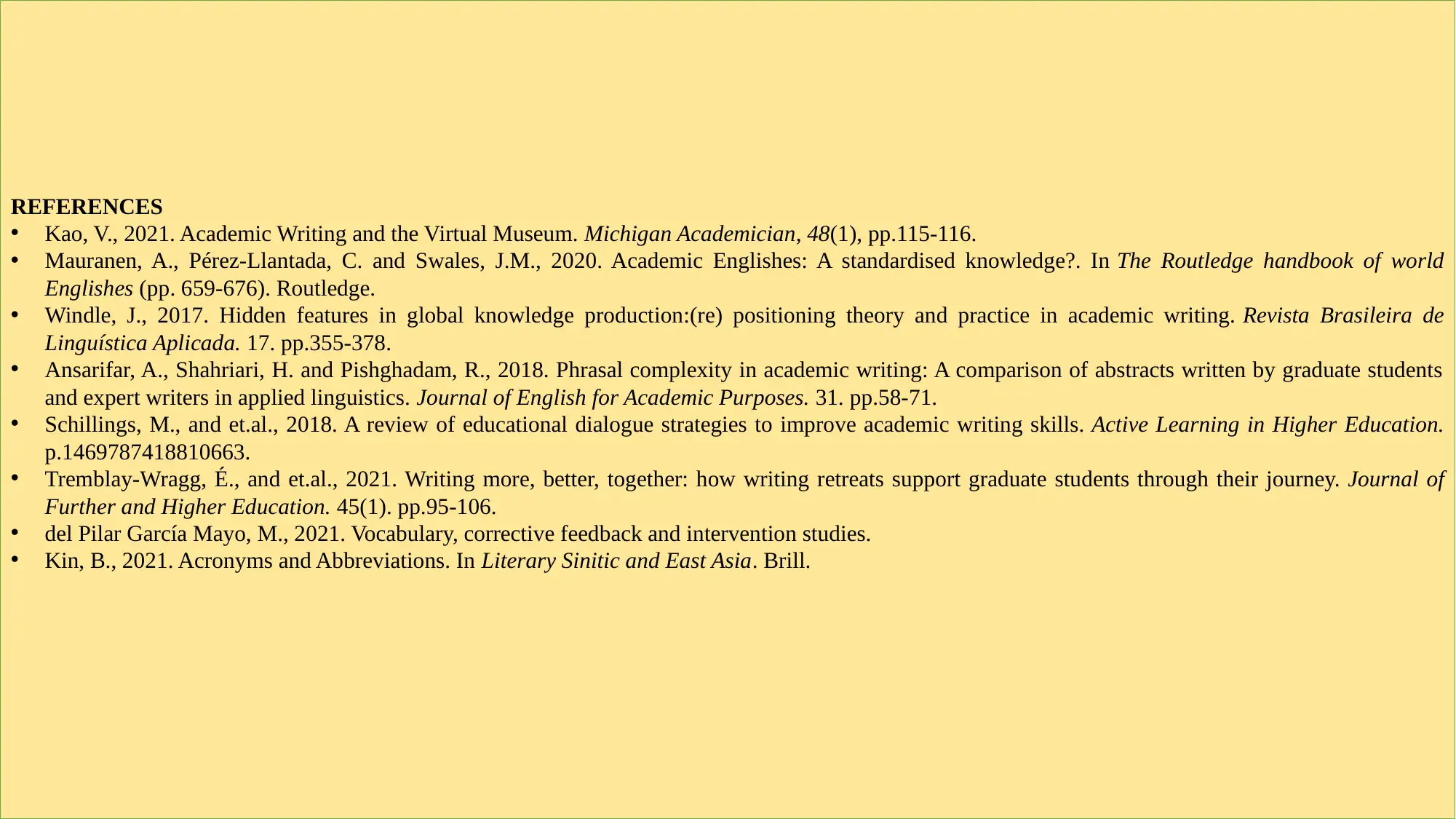
REFERENCES
• Kao, V., 2021. Academic Writing and the Virtual Museum. Michigan Academician, 48(1), pp.115-116.
• Mauranen, A., Pérez-Llantada, C. and Swales, J.M., 2020. Academic Englishes: A standardised knowledge?. In The Routledge handbook of world
Englishes (pp. 659-676). Routledge.
• Windle, J., 2017. Hidden features in global knowledge production:(re) positioning theory and practice in academic writing. Revista Brasileira de
Linguística Aplicada. 17. pp.355-378.
• Ansarifar, A., Shahriari, H. and Pishghadam, R., 2018. Phrasal complexity in academic writing: A comparison of abstracts written by graduate students
and expert writers in applied linguistics. Journal of English for Academic Purposes. 31. pp.58-71.
• Schillings, M., and et.al., 2018. A review of educational dialogue strategies to improve academic writing skills. Active Learning in Higher Education.
p.1469787418810663.
• Tremblay-Wragg, É., and et.al., 2021. Writing more, better, together: how writing retreats support graduate students through their journey. Journal of
Further and Higher Education. 45(1). pp.95-106.
• del Pilar García Mayo, M., 2021. Vocabulary, corrective feedback and intervention studies.
• Kin, B., 2021. Acronyms and Abbreviations. In Literary Sinitic and East Asia. Brill.
• Kao, V., 2021. Academic Writing and the Virtual Museum. Michigan Academician, 48(1), pp.115-116.
• Mauranen, A., Pérez-Llantada, C. and Swales, J.M., 2020. Academic Englishes: A standardised knowledge?. In The Routledge handbook of world
Englishes (pp. 659-676). Routledge.
• Windle, J., 2017. Hidden features in global knowledge production:(re) positioning theory and practice in academic writing. Revista Brasileira de
Linguística Aplicada. 17. pp.355-378.
• Ansarifar, A., Shahriari, H. and Pishghadam, R., 2018. Phrasal complexity in academic writing: A comparison of abstracts written by graduate students
and expert writers in applied linguistics. Journal of English for Academic Purposes. 31. pp.58-71.
• Schillings, M., and et.al., 2018. A review of educational dialogue strategies to improve academic writing skills. Active Learning in Higher Education.
p.1469787418810663.
• Tremblay-Wragg, É., and et.al., 2021. Writing more, better, together: how writing retreats support graduate students through their journey. Journal of
Further and Higher Education. 45(1). pp.95-106.
• del Pilar García Mayo, M., 2021. Vocabulary, corrective feedback and intervention studies.
• Kin, B., 2021. Acronyms and Abbreviations. In Literary Sinitic and East Asia. Brill.
1 out of 6
Related Documents
Your All-in-One AI-Powered Toolkit for Academic Success.
+13062052269
info@desklib.com
Available 24*7 on WhatsApp / Email
![[object Object]](/_next/static/media/star-bottom.7253800d.svg)
Unlock your academic potential
© 2024 | Zucol Services PVT LTD | All rights reserved.


